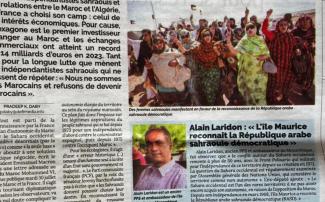Mauritian Newspaper highlights French policy shift and its contradiction with international legality

Port Louis, (Mauritius) 10 August 2024 (SPS)– The Mauritian newspaper "Le Défi Plus" has highlighted the shift in France's stance on the Western Sahara issue in an article written by Alain Laridon, former Mauritian Ambassador to Mozambique and former member of Parliament, published Friday. The article argues that this new position contradicts international law and shows bias towards Moroccan occupation.
In his news article, the Mauritian diplomat criticized France's new support for Morocco's so-called autonomy plan for Western Sahara, asserting that this support is inconsistent with the democratic principles and human rights that France claims to uphold. Laridon noted that the shift in French policy occurs at a time when Morocco is seeking to exploit Western Sahara's natural resources to enhance its economic and geopolitical standing.
The article points out that the Western Sahara issue remains central to international decolonization efforts, with the United Nations regularly reviewing the situation in the region. It views the recent French policy change as a significant shift, highlighting the focus on economic interests or what is termed as political realism at the expense of the longstanding principles of international law.
The diplomat also mentioned that France's connection to Moroccan occupation stems from being the leading foreign investor in Morocco, with trade between the two countries reaching a record 14 billion euros in 2023. This economic relationship, according to Laridon, has significantly influenced French political decisions regarding Western Sahara.
The article notes that the Polisario Front leadership quickly expressed its strong dissatisfaction with the new French stance through a statement by the Sahrawi Foreign Ministry published on the Sahrawi News Agency (SPS). French political parties and members of the French Parliament have also criticized this shift, arguing that it contradicts France's previously balanced position that respected international law and the right of peoples to self-determination.
Laridon suggested that the French criticism of Macron’s position underscores concerns about France’s choice to align with Morocco at the expense of international legitimacy and its potential impact on the Sahrawi struggle for independence, which began in 1973 against Spanish colonization and later against Moroccan occupation.
On the other hand, the Mauritian diplomat considered that the step taken personally by French President Emmanuel Macron will complicate the previous rapprochement between France and Algeria, which has already expressed its displeasure with the stance and subsequently withdrew its ambassador from France.
Laridon also highlighted that the Western Sahara conflict has remained unresolved for over 50 years, noting the region’s rich natural resources, including phosphates, gold, and hydrocarbons, and reminding that his country has recognized the Sahrawi Arab Democratic Republic since the 1980s. (SPS)
090/500/60 (SPS)